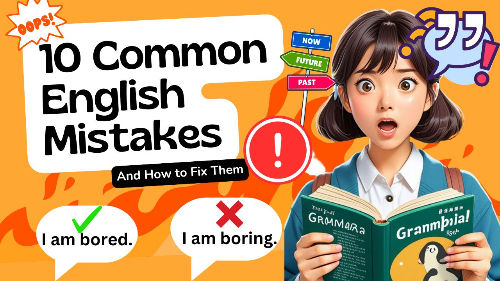10 Common English Mistakes ESL Learners Make (and How to Fix Them!)
- Rose Sensei
- Feb 20
- 4 min read
Updated: Mar 16
Introduction
Learning English is exciting, but even advanced learners sometimes make small grammar or vocabulary mistakes that completely change the meaning of what they say!
Have you ever told someone, “I am boring” when you meant “I am bored”? 😅
Or said, “I am married with a doctor” instead of “I am married to a doctor”?
Don’t worry! You’re not alone.
Watch and Learn! For video lessons that bring our content to life, subscribe to our YouTube channel.
Check out the YouTube video:
>10 Common English Mistakes & How to Fix Them https://youtu.be/zt1rSLCjDtw
In this post, we’ll go through 10 common English mistakes ESL learners make—and most importantly, how to fix them!
Let’s dive in. 🚀

Common English Grammar & Vocabulary Mistakes
🔍 1. Grammar Mistakes
1. Wrong Prepositions
❌ I’m interested for English.
✅ I’m interested in English.
✨ Quick Fix: Some verbs always take specific prepositions.
For example:
→ Good at (She is good at singing.)
→ Afraid of (He is afraid of spiders.)
→ Married to (She is married to a doctor.)
2. Wrong Word Order in Questions
❌ Where I can find the station?
✅ Where can I find the station?✨
✨Tip: English questions usually follow this structure:
(Question Word) + Auxiliary Verb + Subject + Main Verb
Examples:
What do you want?
How does it work?
Where have you been?
3. Confusing Past and Present Perfect
❌ I have seen him yesterday.
✅ I saw him yesterday.
✨ Tip: Use present perfect (have/has + past participle) for experiences or actions without a specific time. Use past simple for finished actions with a time reference (yesterday, last week, etc.).
Examples:
I have seen that movie before. (No time given – experience)
I saw that movie yesterday. (Specific time – past simple)
📖 2. Vocabulary Mistakes
4. False Friends (Words That Look Similar but Mean Different Things)
❌ She is very sensible! (thinking "sensible" = sensitive)
✅ She is very sensitive!
✨ Tip:
Sensible = Logical, reasonable (He made a sensible decision.)
Sensitive = Easily affected by emotions (She is very sensitive to criticism.)
5. Using ‘Make’ and ‘Do’ Incorrectly
❌ I need to do a decision.
✅ I need to make a decision.
✨ Tip:
Make is for creating or producing something (make a plan, make a cake).
Do is for actions, tasks, or duties (do homework, do the laundry).
6. Mixing Up 'Fun' and 'Funny'
❌ The trip was so funny!
✅ The trip was so fun!
✨ Tip:
Funny = Something that makes you laugh (The joke was funny.)
Fun = Enjoyable (The party was fun!)
7. Confusing 'Say' and 'Tell'
❌ He said me that he was tired.
✅ He told me that he was tired.
✨ Tip:
Use “say” when reporting words (He said, ‘I’m tired.’)
Use “tell” when mentioning who received the information (He told me he was tired.)
8. Confusing ‘Borrow’ and ‘Lend’
❌ Can you borrow me a pen?
✅ Can you lend me a pen?
✨ Tip:
Borrow = Take something for a short time (Can I borrow your book?)
Lend = Give something temporarily (I will lend you my book.)
9.Saying ‘Married With’ Instead of ‘Married To’
This is a very common mistake among English learners!
❌ Wrong: She is married with a doctor.
✅ Right: She is married to a doctor.
Rule:
We always use "married to" when talking about someone’s spouse. (She is married to John.)
✨ Tip: A person is married to someone, but a couple is married with children! (They are married with two kids.)
10. Incorrect Use of ‘Look Forward To’
Many learners mistakenly use the infinitive form after "look forward to," but it actually requires a noun or a verb in -ing form.
❌ Wrong: I am looking forward to meet you.
✅ Right: I am looking forward to meeting you.
Rule:
"Look forward to" is always followed by a noun or a verb in -ing form.
✅ I’m looking forward to the holiday.
✅ She is looking forward to seeing her family.
✨ Tip: Think of "to" in "look forward to" as a preposition, not part of an infinitive!
🎯 3. Bonus: Mini Quiz – Spot the Mistake!
Can you find and correct the mistakes in these sentences?
1) She is married with a doctor.
2) I am looking forward to meet you.
3) He said me that he was tired.
(Answers)
1️⃣ married to a doctor,
2️⃣ looking forward to meeting you,
3️⃣ He told me that he was tired.
Conclusion
English mistakes happen to everyone, but now you know how to avoid them! 🎉
Keep practising, listening, and reading to improve your skills.
Want more English tips? Check out our other posts or try our free English grammar quiz! ✅
What’s the most confusing mistake you’ve made in English?
Share in the comments! 👇😊
Love This Content? Get more delivered to you! Sign up for our weekly email with fresh ideas for learning English.
Don't Just Read, Watch! Subscribe to our YouTube channel to complement this blog post with video tutorials and explanations.
Question? Contact us on the form below.



Yorumlar